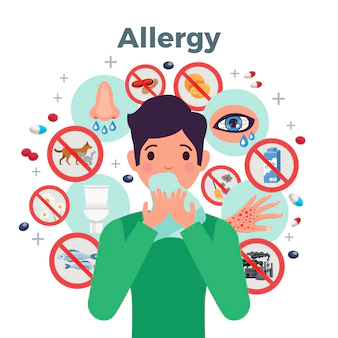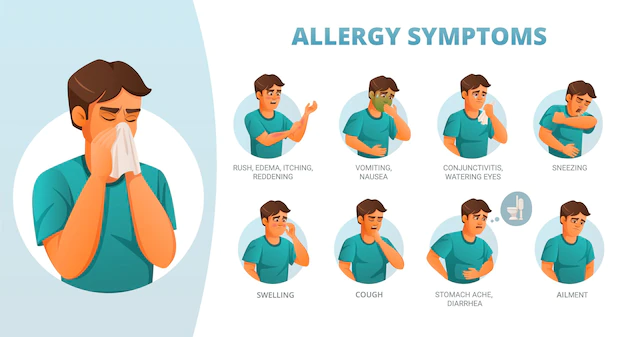Chronic Disease
Food Allergies 8 Natural Home Remedies And Steps To Tackle Food Allergy

Introduction
Do you suffer from food allergies? If so, you’re not alone. It’s estimated that about 15 million Americans suffer from food allergies, and that number is only on the rise. While there is no cure for food allergies, there are steps that you can take to manage them and keep them under control. In this blog post, we will explore eight natural home remedies and steps that you can take to tackle your food allergies. From diet changes to supplements and more, read on to learn how you can find relief.
If you suffer from food allergies, you know that they can be a real pain to deal with. Not only can they cause uncomfortable symptoms like bloating, gas, and diarrhea, but they can also be dangerous if not managed properly. While there is no cure for food allergies, there are steps that you can take to manage them and keep them under control. In this blog post, we will explore eight natural home remedies and steps that you can take to tackle your food allergies. From diet changes to supplements and more, read on to learn how you can find relief.

What are food allergies?
Food allergies are an adverse reaction to a food or ingredient that the body perceives as harmful. The immune system response to this “threat” can result in symptoms such as hives, difficulty breathing, swelling of the throat and vomiting. In severe cases, anaphylactic shock – a potentially life-threatening condition – can occur.
There are two types of food allergy reactions: immediate and delayed. Immediate reactions usually happen within minutes to hours after eating the offending food and are often caused by proteins that trigger a histamine release in the body. Delayed reactions can take place up to several days after consuming the allergen and are usually IgE-mediated, meaning they involve antibodies produced by the immune system.
While any food has the potential to cause an allergic reaction, there are eight foods that account for the majority of reactions in the United States: milk, eggs, peanuts, tree nuts (such as walnuts and almonds), soy, wheat, fish and crustacean shellfish (such as shrimp and lobster).
Types of food allergies
There are many different types of food allergies that people can suffer from. The most common type of food allergy is an allergy to peanuts. Other common food allergies include allergies to soy, wheat, fish, and eggs. Some people may also be allergic to certain fruits, vegetables, or meats.
People with food allergies often have severe reactions to the foods they are allergic to. These reactions can include difficulty breathing, swelling of the throat or tongue, hives, and vomiting. In some cases, a food allergy can be life-threatening. If you think you may have a food allergy, it is important to see a doctor for diagnosis and treatment.
If you suffer from food allergies, you know that they can be a real pain to deal with. Not only can they cause uncomfortable symptoms like bloating, gas, and diarrhea, but they can also be dangerous if not managed properly. While there is no cure for food allergies, there are steps that you can take to manage them and keep them under control. In this blog post, we will explore eight natural home remedies and steps that you can take to tackle your food allergies. From diet changes to supplements and more, read on to learn how you can find relief.
Symptoms of food allergies
There are a number of different symptoms that can be associated with food allergies, and these can vary depending on the person and the severity of their allergy. Some common symptoms include:
• itching or swelling of the mouth or throat
• hives or eczema
• wheezing or difficulty breathing
• nausea and vomiting
• cramping and diarrhoea
• dizziness or lightheadedness.
If you experience any of these symptoms after eating, it’s important to see a doctor as soon as possible to get a diagnosis. In some cases, food allergies can be severe and even life-threatening, so it’s important to seek medical help if you think you may have one.
How to diagnose a food allergy?
There are a few ways that you can diagnose a food allergy. The most common way is by doing an allergy test. This can be done by a skin prick test or a blood test. These tests will look for the presence of antibodies to the specific allergen in your blood. If you have a positive result, it means that you are allergic to that particular food.
Another way to diagnose a food allergy is by doing an Elimination Diet. This diet involves removing all potential allergens from your diet for a period of time, and then slowly reintroducing them one at a time. If you experience symptoms after eating a particular food, then you are likely allergic to that food.
If you suspect that you have a food allergy, it is important to see an allergist for proper testing and diagnosis.
Natural home remedies for food allergies
If you’re one of the many people who suffer from food allergies, you’ll know that they can be a real pain to deal with. The good news is that there are plenty of natural home remedies that can help to ease the symptoms and even prevent an allergic reaction from occurring in the first place.
One of the best things you can do is to identify the foods that you’re allergic to and then avoid them as much as possible. This may seem difficult, but it’s actually quite easy once you know what to look for. Start by keeping a food diary and noting down every time you have an allergic reaction. After a while, you’ll start to see patterns emerge and it will be easier to work out which foods are causing the problem.
Once you know which foods to avoid, there are a number of other natural home remedies that can help. For example, taking probiotics has been shown to be effective in reducing the symptoms of food allergies. Probiotics are live bacteria that occur naturally in our gut and they help to keep our digestive system healthy. They can be found in fermented foods like yogurt or kefir, or they can be taken as supplements.
Another helpful remedy is quercetin, which is a type of antioxidant found in many fruits and vegetables. It’s thought to work by stabilizing mast cells, which are involved in the release of histamine (the substance that causes allergy symptoms). You can buy quercetin supplements from health

When to see a doctor for help?
If you think you or your child may have a food allergy, see your doctor. They can do a skin prick test or blood test to find out if you’re allergic to a particular food.
If you have a severe allergic reaction (anaphylaxis), you’ll need immediate treatment. Anaphylaxis is a medical emergency that requires prompt treatment with epinephrine (adrenaline).
If you have had anaphylaxis, your doctor will probably prescribe an auto-injector (EpiPen or Auvi-Q) and tell you how to use it.
The bottom line: If you think you or your child has a food allergy, see a doctor
Conclusion
There you have it, eight natural home remedies and steps to take to help tackle food allergies. As you can see, there are a number of things you can do to help lessen the severity of your symptoms and make dealing with food allergies a little bit easier. Do you have any other tips or tricks for managing food allergies? Share them with us in the comments below!
Global Ayucare
is an ayurvedic firm that provides proper knowledge about ayurveda and its benefits. Their team of experts offer consultation services to help individuals understand their own constitution and how to maintain balance through diet, lifestyle, and herbal remedies. Global Ayucare also offers a range of ayurvedic products for sale on their website.Looking for some ayurvedic content? Check out our blog and social media handles for all things ayurveda!
If you’re looking for a way to stay up-to-date on all the latest news and information from Global Ayucare, then be sure to follow us on Social media platfrom! We regularly post updates about new products, events, and anything else that might be of interest to our customers. Plus, it’s a great way to see what our team is up to behind the scenes!
Dr.Arindham Chatterjee
(Ayurvedic Specialist) B.A.M.S.(R.G.U.H.S, Bangalore, India), Diploma in Panchkarma (Karnataka, India), M.D.(Global AyucareR – India)
Dr. Arindham Chatterjee pursued his passion for Ayurveda and qualified as an Ayurvedic Physician in 2007.
He is a Health Consultant, Author, Educator and Panchkarma Specialist who had written many informative articles on health and well being. With the dream of sharing the proper and authentic knowledge of Ayurveda and help the people all over the world, he had started his journey across the globe. He has founded Global AyucareR in the year 2009, a complete health care portal through which he had cured thousands of clients all across India as well as abroad. Because of his curiosity to explore more in Ayurveda he had been able to successfully cure thousands of patients all across the world.
Conclusion
Poor sleep is a condition that can have many causes, some of which are easily treatable. If you think you might be suffering from poor sleep, talk to your doctor and ask about treatment options. With the right diagnosis and treatment, you can get your sleep quality back on track and start enjoying the benefits of a good night’s rest.
There are many potential causes of poor sleep, from medical conditions to lifestyle choices. But whatever the cause, poor sleep can have a major impact on your health and wellbeing.
If you think you might be suffering from poor sleep, the first step is to see your doctor. They can carry out tests to rule out any underlying medical conditions and help you find the right treatment.
With the right diagnosis and treatment, you can get your sleep quality back on track and start enjoying the benefits of a good night’s rest.

